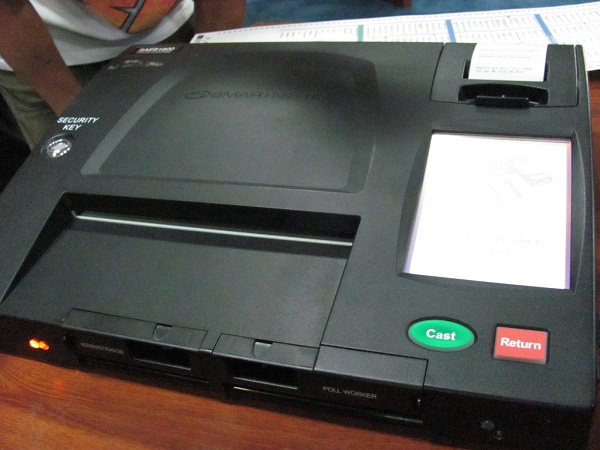For sale: Comelec’s used PCOS machines

PCOS machine. INQUIRER.net FILE PHOTO
MANILA, Philippines — Will they work wonders for the buyers?
The Commission on Elections (Comelec) is finally letting go of the voting machines used during the country’s first automated elections in 2010.
The electoral body has issued a notice for the auction of 81,775 precinct count optical scan (PCOS) machines on Aug. 23, setting a minimum bid price of P187.5 million, or P2,293 per machine.
The Comelec had spent P9 billion for the PCOS machines that were first used in the May 2010, national elections and again in the May 2013 mid-term elections.
The machines were leased from systems provider Smartmatic Corp. for P7.2 billion for the country’s transition to automated elections in May 2010. The Comelec later purchased the machines for P1.8 billion for use in the 2013 balloting.
Article continues after this advertisement2010 glitches
When introduced in 2010, the PCOS machines were tauted for their speed, accuracy and reliability in recording, counting and transmitting data to canvassing centers where the votes were automatically added up.
Article continues after this advertisementBut the process was marred by glitches during actual use, with some machines breaking down and delaying transmittal to the canvassing centers. In many instances, the machines’ built-in ultraviolet mark scanners failed to read the security features on the ballots.
Despite the doubts and criticisms, the PCOS machines were again used in 2013.
The Comelec, however, was prevented from using the PCOS machines for the 2016 elections after the Supreme Court thumbed down the poll body’s contract with Smartmatic to refurbish the machines, and ordered a public bidding.
In comes OMR
The poll body decided to instead lease around 94,000 optical mark reader machines (OMR) from Smartmatic for P7.9 billion.
It purchased those same machines for P2.1 billion for the 2019 midterm elections.
The OMRs will be used again in the May 9, 2022 elections, even though President Duterte had asked Comelec to dispose of the Smartmatic election system due to glitches reported in 2019.
Smartmatic will remain Comelec’s technology provider for the 2022 automated elections.
It bagged a P402-million contract to provide the election software and a P637-million contract to refurbish 97,345 vote counting machines.
2014 `sale’
Comelec officials had considered selling the PCOS machines to other countries as early as 2014, with spokesperson James Jimenez saying it would be a “good exit’’ strategy to recoup the funds that were spent for them.
They believed that after automating elections in 2010, the Philippines had become a model in Asia, and selling the equipment to countries planning a similar shift such as Indonesia, Japan, Korea, Bangladesh and Nepal seemed a cinch then.
“Many countries are actually asking us about our experience and how they can learn from it. Because of this, there is a possibility it is now our turn to become vendors, and it is unlikely that there will be no takers,” Jimenez then said.